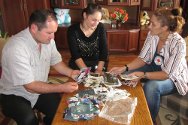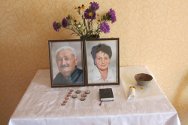Georgia: Tamar comes home
24-08-2011 Feature
Many families still await news of relatives missing since the August 2008 conflict. In 2010, the ICRC’s Tbilisi delegation created mechanisms to facilitate dialogue on missing persons between the various authorities. The organization also launched a family-support project, focusing on psychological aspects. With the cooperation of local non-governmental psychosocial organizations, the project has assisted some 330 families since it started in March 2010.
ICRC doctor and psychotherapist Maia Alkhazishvili is a member of the project team. She worked with the first family to receive the remains of a relative under the ICRC-chaired Coordination Mechanism linked to the August 2008 conflict. This emotional event ended three years of uncertainty for the family, and enabled them to mourn their relative according to local custom. Tamar’s remains were exhumed and transferred to Tbilisi National Forensic Bureau, where analysis and identification were carried out with the support of the ICRC Regional Forensic Adviser.
"I first met Tamar’s family at the city mortuary in Tbilisi,” explains Maia. “Her husband and two children were trying to hide their emotions. The only thing her husband Elguja told me was how grateful he was to the ICRC, because without our support he would not have been able to grieve properly. He told us: "Since the moment I lost her three years ago, this is the first time I’ve been able to cry. Thank you for that.”
Maia continues: “Every case is different. Everyone has their own way of coping with uncertainty and pain and I am happy to be able to provide professional psychological support as a member of the ICRC team.”
The ICRC psychotherapist attended Tamar’s funeral. This was more than just a professional obligation; the family asked her to attend as they left the morgue. The funeral took place in one of the villages near the IDP settlement where the family currently lives. Of course this was a sad day, but it was tinged with happiness, as it gave many other families of missing people new hope that they too might one day find out what had happened to their missing relatives.
In his farewell speech, Tamar’s son said: "Mother, we were expecting you for so long and you are leaving us again today. These horrible three years are over, when we did not know where you were, alive or dead. But now we know where you are. We will come to your grave, we will light candles and we will pray for you.”
“I accompanied the family in their grieving process after the funeral,” explains Maia. “I visited them to provide psychological support. For me these are very touching moments and the conversations are very emotional.”
Elguja already had throat cancer at the time of the funeral. He once told Maia: “I know the real reason for my disease. When Tamar and I were escaping from Tskhinvali at the start of the war, we had to cross a river. Tamar couldn’t get out of the water because of the current. I was there but I was unable to help my wife. That anger and sorrow were stuck in my throat for the next three years. Now I feel relieved and I am not afraid of dying any more, because I know that my grave will be next to Tamar's. We will be together again.”
International Day of the Disappeared will be marked throughout Georgia on 30 August, and the ICRC will be inviting the families of missing persons to attend. Elguja will not be among them – he joined his beloved Tamar in June.

